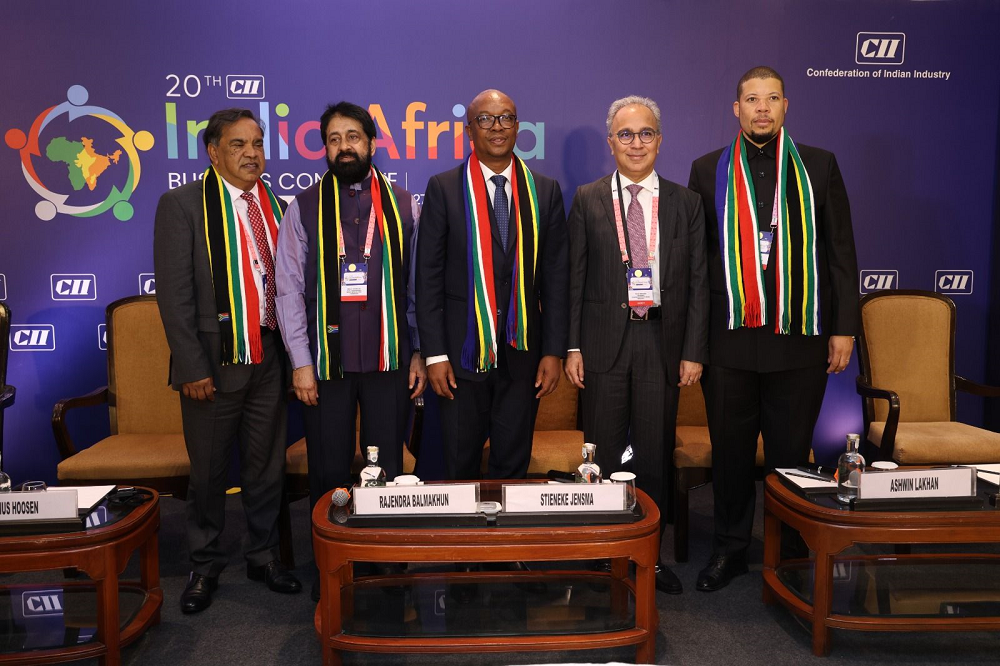
At the 20th CII India–Africa Business Conclave, South Africa’s Minister of Trade, Industry and Competition, H.E. Mr. Parks Mpho Tau, delivered the keynote address under the theme “Deepening the South Africa–India Strategic Partnership.” He highlighted the growing depth of bilateral relations, underscored new opportunities in energy, minerals, and manufacturing, and called for stronger business-to-business collaboration between the two nations.
Resetting the Bilateral Relationship
Minister Tau began on a warm and personal note, recalling his recent meeting with India’s Minister of Commerce and Industry, Piyush Goyal. “I had the privilege of being hosted at his home, where I experienced not only India’s famed hospitality but also the warmth of our friendship,” he said.
He noted that both sides agreed on one crucial objective: “We must accelerate efforts to reset and strengthen our trade and investment relationship. To this end, our respective departments have already begun restructuring to deliver a more formal, structured trade agreement within the next two months.”
South Africa’s G20 Presidency – A Global South Moment
South Africa assumes the presidency of the G20 in 2025—a role Minister Tau described as a historic opportunity to advance the voice of the Global South. “This is a strategic moment to place the collective interests of the Global South firmly on the international development agenda,” he emphasised.
But he also cautioned about the global backdrop of “escalating geopolitical tensions, climate-related challenges, and fragmented global supply chains” that make resilience and solidarity more urgent than ever. Building on the legacies of Indonesia, India, and Brazil, South Africa aims to champion sustainable energy transition, digital transformation, expansion of global trade through the AfCFTA, and stronger integrity in business practices.
India as a Natural Partner
Minister Tau was unequivocal in placing India at the centre of South Africa’s economic vision. “We see India as a natural partner in this journey,” he declared. The African Continental Free Trade Area (AfCFTA), he said, offers immense opportunities for Indian companies to collaborate on agriculture, manufacturing, infrastructure, and services.
“We invite Indian companies to collaborate with us in building regional manufacturing and distribution hubs that can serve the entire African continent,” he urged.
Trade on Solid Ground
The Minister highlighted the growing strength of bilateral trade. In 2023, South Africa’s exports to India surpassed $5 billion, led by gold, coal, and minerals such as copper and manganese. India’s exports to South Africa included petroleum products, pharmaceuticals, vehicles, textiles, and chemicals.
Agricultural trade is also flourishing. “Our citrus exports to India increased by 20,000 tons in just four years, and last year we shipped our first consignment of avocados to India,” Tau shared proudly. The aim now, he added, is to further diversify and expand this trade basket.
Investment Footprints – A Two-Way Street
India has emerged as a major investor in South Africa. Companies such as Tata, Cipla, Mahindra, and Vedanta have expanded their presence, using South Africa as a launchpad into Africa. Conversely, South African firms like Naspers, FirstRand Bank, CapeSpan, and Old Mutual have successfully ventured into India.
“These reciprocal investments are proof of the strength of our economic bonds,” the Minister noted.
Energy, Minerals, and Green Growth
Looking ahead, Minister Tau identified the energy sector as a key driver of future collaboration. “South Africa is rapidly transforming its energy landscape and becoming a leader in solar and wind power generation. We see major synergies with India as it pursues its own energy security goals.”
He highlighted opportunities in renewable energy infrastructure, green hydrogen, electric vehicles, and battery technologies. Critical minerals were also underscored as a strategic area: “With abundant reserves and India’s expertise in processing and technology, we can establish partnerships that ensure beneficiation at source, sustainable mining practices, and industrial growth across both countries.”
The Industrial Development Corporation (IDC) of South Africa, he added, is ready to partner with Indian companies in these ventures.
Beyond Energy – Expanding Sectors
Tau pointed to further opportunities in pharmaceuticals, healthcare, automotive components, agro-processing, defence, aerospace, ICT, and digital services. Skills development and training, he said, would remain at the heart of South Africa’s growth agenda.
“South Africa is committed to building a green manufacturing sector anchored in renewable energy, hydrogen technologies, and sustainable industrial practices,” he emphasised. “We see India as an indispensable partner in advancing this transition.”
A Kinship to Drive the Future
Closing his address, Minister Tau reflected on the historic relationship between the two nations. “South Africa and India share not only a deep political and social relationship but also a brotherly kinship. It is this kinship that must drive us to lead a new era of global trade and investment—an era defined by resilience, sustainability, and inclusivity.”
He invited Indian companies to explore South Africa’s portfolio of 67 curated investment projects worth $40 billion, spanning diverse sectors. “The opportunities before us are immense. Let us work together, collaborate deeply, and build the strong partnerships necessary to unlock prosperity for both our countries and for the wider Global South.”
Leave a Reply